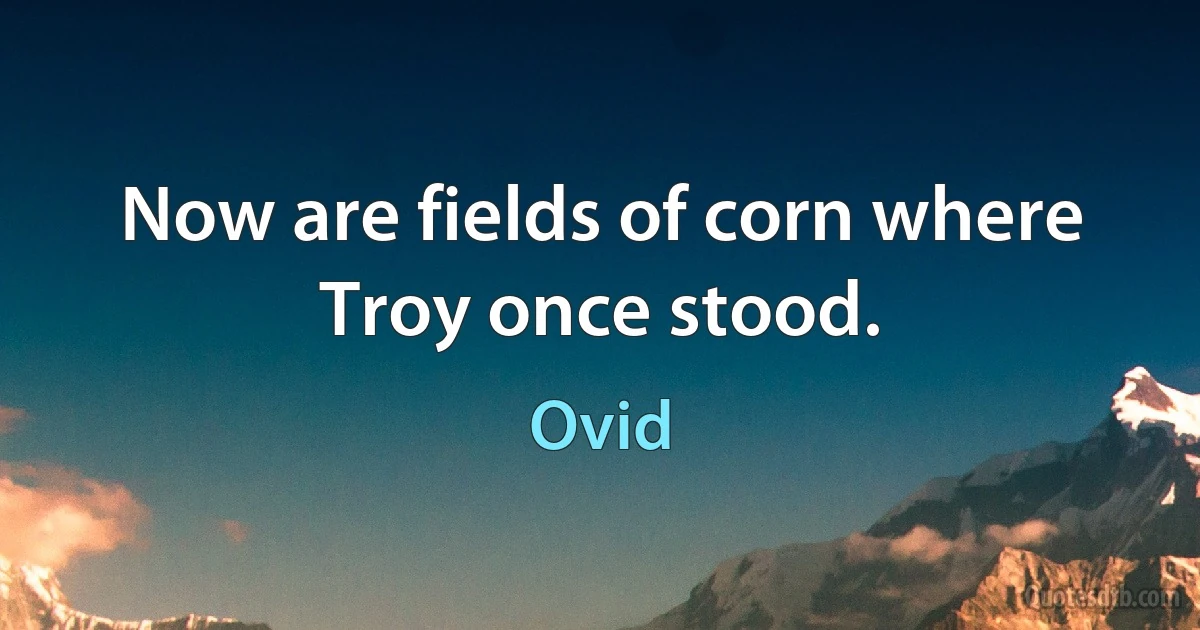Corn Quotes - page 5
First: my Friend planted a Row of Indian corn that was Coloured Red and Blue; the rest of the Field being planted with corn of the yellow, which is the most usual color. To the Windward side, this Red and Blue Row, so infected Three or Four whole Rows, as to communicate the same Colour unto them; and part of ye Fifth and some of ye Sixth. But to the Leeward Side, no less than Seven or Eight Rows, had ye same Colour communicated unto them; and some small Impressions were made on those that were yet further off.

Cotton Mather
The growing extravagance of the people, and the increasing demand for the article of forage in this quarter, have become a very alarming affair. Hay is from sixty to eighty dollars a ton, and upon the rise.* Corn is ten dollars a bushel, and oats four; and every thing else, that will answer for forage, in that proportion. Carting is nine shillings a mile by the ton, and people much dissatisfied with the price. I have represented to the States of Rhode Island and Connecticut the absolute necessity of legislative interposition, to settle the prices of things upon some reasonable footing, of all such articles and services as are necessary for the use of the public in my department. I am going to do the same to the Council of this State. What effect it will have, I cannot say; but, if there is not something done to check the extravagance of the people, there are no funds in the universe that will equal the expense.

Nathanael Greene
In a field of ripening corn I came to a place which had been trampled down by some ruthless foot; and as I glanced amongst the countless stalks, every one of them alike, standing there so erect and bearing the full weight of the ear, I saw a multitude of different flowers, red and blue and violet. How pretty they looked as they grew there so naturally with their little foliage! But, thought I, they are quite useless; they bear no fruit; they are mere weeds, suffered to remain only because there is no getting rid of them. And yet, but for these flowers, there would be nothing to charm the eye in that wilderness of stalks. They are emblematic of poetry and art, which, in civic life-so severe, but still useful and not without its fruit-play the same part as flowers in the corn.

Arthur Schopenhauer
Keeping the Army of Northern Virginia fed and clothed was a never-ending struggle. His men were making their own shoes now, when they could get the leather, which as not often. The ration was down to three-quarters of a pound of meat a day, along with a little salt, sugar, coffee- or rather, chicory and burnt grain- and lard. Bread, rice, corn... they trickled up the Virginia Central and Orange and Alexandria Railroad every so often, but not nearly often enough. He would have to cut the daily allowance again, if more did not arrive soon. President Davis, however, was as aware of all that as Lee could make him. To hash it over once more would only seem like carping.

Harry Turtledove
It was an extraordinary display! Daily did this manner of slaughter and plundering proceed. And at night the shrieks of the women captives who were being raped, deafened the ears of the people...All those heads that had been cut off were built into pillars, and the captive men upon whose heads those bloody bundles had been brought in, were made to grind corn, and then their heads too were cut off. These things went on all the way to the city of Agra, nor was any part of the country spared.

Ahmed Shah Durrani
The human eye loves to rest upon wide expanses of pure colour: the moors in the purple heyday of heather, miles of green downland, and the sea when it lies calm and blue and boundless, all delight it; but to some none of these, lovely though they all are, can give the same satisfaction of spirit as acres upon acres of golden corn. There is both beauty and bread and the seeds of bread for future generations.

Flora Thompson
In Antwerp I did not even know what the Impressionists were, now I have seen them and though not being one of the club, yet I have much admired certain Impressionist pictures – Degas, nude figure – Claude Monet, landscape. And now for what regards what I myself have been doing, I have lacked money for paying models, else I had entirely given myself to figure painting but I have made a series of colour studies in painting simply flowers, red poppies, blue corn flowers and myosotys. White and rose roses, yellow chrysantemums – seeking oppositions of blue with orange, red and green, yellow and violet, seeking THE BROKEN AND NEUTRAL TONES to harmonise brutal extremes. Trying to render intense COLOUR and not a grey harmony.

Vincent van Gogh
The Englishman, in eleven years, gets three bushels more of wheat than the Frenchman. He gets three crops of barley, tares, or beans, which produce nearly twice as many bushels per acre, as what the three French crops of spring corn produce. And he farther gets, at the same time, three crops of turnips and two of clover, the turnips worth 40s. the acre, and the clover 60s. that is 12l. for both. What an enormous superiority! More wheat; almost double of the spring corn; and above 20s. per acre per annum in turnips and clover. But farther; the Englishman's land, by means of the manure arising from the consumption of the turnips and clover is in a constant state of improvement, while the Frenchman's farm is stationary.

Arthur Young
An aching to be once again in the land from which he grew gave him no rest. There is no calm for those who are uprooted. They are wanderers, homesick and defiant. Love itself is helpless to heal them though the dust rises with every footfall-drifts down the corridors-settles on branch or cornice-each breath an inhalation from the past so that the lungs, like a miner's, are dark with bygone times.
Whatever they eat, whatever they drink, is never the bread of home or the corn of their own valleys. It is never the wine of their own vineyards. It is a foreign brew.

Mervyn Peake
The slaves of our times are not all those factory and workshop hands only who must sell themselves completely into the power of the factory and foundry-owners in order to exist, but nearly all the agricultural laborers are slaves, working, as they do, unceasingly to grow another's corn on another's field, and gathering it into another's barn; or tilling their own fields only in order to pay to bankers the interest on debts they cannot get rid of. And slaves also are all the innumerable footmen, cooks, porters, housemaids, coachmen, bathmen, waiters, etc., who all their life long perform duties most unnatural to a human being, and which they themselves dislike.

Leo Tolstoy
I'm a man with many defects. I love. I sing. I dream. I was born in the poor countryside. I was raised in the countryside, planting corn and selling sweets made by my grandmother. My children, my two daughters are with me and I want a better world for my grandchildren, for your grandchildren.

Hugo Chávez



